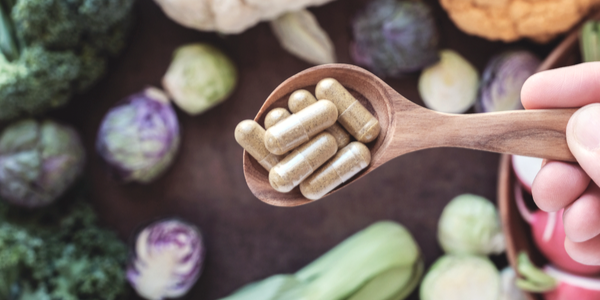
Without naturally occurring digestive enzymes, the body would have a difficult time breaking down food into an absorbable form. These enzymes play a major role in digestion and a deficiency of them can lead to a variety of gastrointestinal symptoms.
What really are these enzymes? Is there a supplement form and if so, are digestive enzymes safe? Learn this plus so much more in this article.
What Are Digestive Enzymes?
Although many people associate the stomach with digestion, it does little more than store food before it is ready to be broken down or digested. Digestion is a highly thermodynamic process, meaning it requires a lot of energy and assistance from helpers such as enzymes. These mighty molecules are considered protein-based catalysts, which means they help initiate all different types of metabolic reactions.
Thus, digestive enzymes help the body to break down carbohydrates, fat, and protein and increase the bioavailability of nutrients. The pancreas secretes digestive enzymes when the food bolus passes through the esophagus. The mouth, stomach, and small intestine secrete some as well.
Without an underlying digestive or accessory digestive condition, the health of the digestive tract, including intestinal permeability, pH, and gut microbe, is key to success.
Types of Digestive Enzymes
Three main enzymes function to break each macronutrient respectively and include:
• Amylase: Secreted from the salivary glands and the pancreas, this enzyme helps break down carbohydrates into the smallest sugar molecules known as glucose. Insufficiency of this enzyme frequently leads to diarrhea, because the undigested starch molecules rapidly draw water into the colon (dumping syndrome).
• Protease: Released by the pancreas into the proximal small intestine, protease breaks down proteins into peptides and amino acids by mixing with other denatured proteins caused by gastric juices. Interestingly, proteases also keep certain bacteria, yeast, and protozoa out of the intestine and a shortage of them can lead to allergies, toxicity, or overgrowth.
• Lipase: Also secreted by the pancreas, lipase breaks down fat into a glycerol molecule plus three fatty acids by working directly with bile. Lack of lipase leads to fat-soluble vitamin A, D, E, and K deficiency.
What Leads to Digestive Enzyme Deficiency?
In the absence of digestive enzymes, malabsorption often occurs and can lead to malnutrition. Technically, this is referred to as exocrine pancreatic insufficiency (EPI). However, the pancreas has plenty of endocrine (hormonal) functions such as glucagon and insulin secretion too.
Various reasons exist as to why someone does not produce enough digestive enzymes naturally. The main issues include:
• Insulin dysregulation from a diet high in refined carbs or due to diabetes
• Gallstones that block the bile ducts
• Poor Sphincter of Oddi function (releases bile and pancreatic juices)
• Alcohol abuse
• Micronutrient deficiency
• Protein deficiency
• Intestinal inflammation
• Food sensitivities
• GI infection
• Repeated antibiotic exposure
• Chronic Smoking
• Cystic Fibrosis
• Chronic pancreatitis
• Pancreatic cancer
Furthermore, symptoms of digestive enzyme deficiency vary based on the root cause. However, common ones include:
• Bloating
• Gas
• Abdominal pain and cramping
• Diarrhea
• Constipation
• Gut microbiota dysbiosis
• Steatorrhea (stools that float)
• Foul-smelling stools
• Feeling full quickly
• Weight loss
• Food allergies and intolerances
Pancreatic Enzyme Replacement Therapy
If the body cannot produce enough digestive enzymes naturally, as is the case in conditions like cystic fibrosis, digestive enzyme therapy via prescription or over-the-counter replacement is usually necessary.
Nowadays, many different kinds and forms of synthetic digestive enzymes exist but are all intended to mimic the function of natural enzymes. The most potent versions are created or derived from the pancreas of a pig.
Pancreatic enzyme replacement therapy (PERT) is only available via prescription and subject to the Food and Drug Administration's (FDA) approval and regulation. They are coated to prevent stomach acid from digesting the medication before it reaches the small intestine where it is actually needed.
PERT Dosing & Types
Dosages will depend on the reason for taking the medication, weight, height, eating habits, and other co-conditions. Generally, these are only provided to people with severe exocrine pancreatic deficiency as in cystic fibrosis, pancreatitis, or pancreatic cancer.
On the other hand, over-the-counter (OTC) digestive enzyme products are generally considered supplements and can be found near other dietary supplements. These kinds can be made from an animal pancreas or plants such as fruit, fungi, mold, or yeast. People who suffer from IBS and other digestive distress like extreme bloating and gas seek out this type.
While most synthetic digestive enzyme supplements are encapsulated (come in a pill), tincture, powder, and liquid forms also exist. Some are now vegan, also contain probiotics, or best taken with specific foods. They may be intended for specific problems like lactose intolerance or extreme gas and so forth as well.
If choosing to take these enzymes, be sure to read the label carefully, check the ingredients and follow any directions for best results. Working with a dietitian can help narrow down who is appropriate to take them, what kind to take and when and how to consume them.
Digestive Enzyme Side Effects
The most common side effect of synthetic digestive enzymes is constipation, although nausea, abdominal cramps, and diarrhea have also been reported. Because of these undesirable consequences, it is not recommended to take synthetic enzymes unless needed.
However, many people still do and anecdotally claim that it helps with their digestion although it is unknown whether this is a placebo effect or reality.
Nonetheless, creating a healthy gut reduces side effects and can be achieved by:
• Increasing probiotic-rich foods in the diet
• Reducing alcohol intake
• Identifying food aversions and reducing/eliminating accordingly
• Staying adequately hydrated
• Eating plenty of antioxidants and other anti-inflammatory foods
Finding and taking the correct dose also lessens the risk of side effects and is best achieved by working with a qualified health practitioner.
Natural Food Sources of Enzymes
Food really can "be thy medicine" and this is a great example of how. Some foods naturally contain digestive enzymes (listed next to the food) and they are as follows:
1. Avocados – lipase
2. Bananas – amylases and glucosidases
3. Ginger – zingibain (protease)
4. Honey (especially raw) – amylases, diastases, invertases, and proteases
5. Kefir – lactase, lipase and proteases
6. Kimchi – amylases, lipases, and proteases
7. Kiwi – actinidain (protease)
8. Mangos – amylase
9. Miso – amylases, lactases, lipases and proteases
10. Papayas – papain
11. Pineapples – bromelain
12. Sauerkraut – amylases, lipases and proteases
The Bottom Line
Playing a major role in digestion, digestive enzymes help break down carbs, fat, and protein into their absorbable form for energy and micronutrients. A deficiency of them often leads to malabsorption and accompanying symptoms like gas and bloating and at worst, malnutrition.
To prevent this, synthetic forms of digestive enzymes are sometimes necessary. While the most potent forms require a prescription, there are many over-the-counter versions as well. Some foods also naturally contain these powerful molecules!
References:
Ash, M. Digestive Enzymes. Clinical Education. Published January 11, 2017. www.clinicaleducation.org/news/digestive-enzymes/.
Enzymes. CFFoundation. https://www.cff.org/Life-With-CF/Daily-Life/Fitness-and-Nutrition/Nutrition/Taking-Care-of-Your-Digestive-System/Enzymes/.
Pietrangelo A. What Are Digestive Enzymes and How Do They Work? Healthline. Published February 28, 2020. www.healthline.com/health/exocrine-pancreatic-insufficiency/the-role-of-digestive-enzymes-in-gi-disorders.
Raman R. 12 Foods That Contain Natural Digestive Enzymes. Healthline. Published May 15, 2018. www.healthline.com/nutrition/natural-digestive-enzymes.







